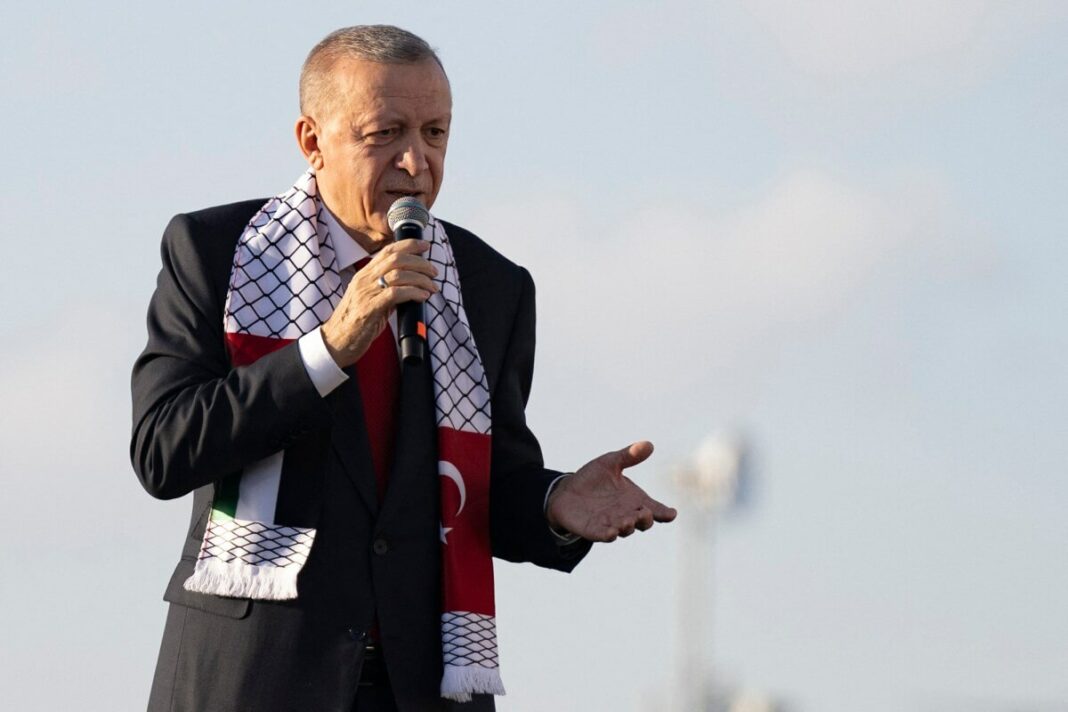Turkish President Recep Tayyip Erdoğan is considering imposing economic sanctions on Israel due to its ongoing attacks on Gaza, which have claimed the lives of more than 25,000 people since October 7, according to reports in the Israeli media.
Erdoğan, whose government faces accusations of increasing its trade with Israel during the Israel-Hamas war despite his anti-Israel rhetoric, is considering removing Israel from Turkey’s list of export destinations, according to the reports.
Following the Israeli attacks on Gaza, which began in retaliation for an unprecedented attack by the Palestinian militant group Hamas on Israel on October 7 and claimed the lives of around 1,200 people in Israel, Erdoğan has directed strong criticism at Israel, accusing it carrying out a “genocide” and committing “war crimes” in Gaza.
Official statistics and recent reports by investigative journalist Metin Cihan have shown that despite Erdoğan’s condemnation of Israel, trade with Israel significantly increased right after the conflict started, which prompted many to accuse Erdoğan of “hypocrisy” in his defense of the Palestinian people.
Israeli media outlets such as The Jerusalem Post has reported that Erdoğan is thinking of going beyond rhetoric and taking some economic measures against Israel.
“The significant implication of this decision is that Turkey will discontinue subsidizing trade and withdraw support for businesses engaged in operations with Israel. Furthermore, it serves as a clear message to Turkish business owners that state assistance will not be provided if they choose to engage in trade with Israel,” The Jerusalem Post reported on Sunday.
This move follows Israel’s 13th place on Turkey’s list of exports in 2023, despite the war’s impact, accounting for goods valued at $5.42 billion, approximately 2.1 percent of total exports. This marks a noticeable decrease from the $7 billion in exports in 2022.
Contrary to Erdoğan’s anti-Israel policy, official data from the Turkish Transport Ministry revealed that between October 7 and December 31, 2023, an average of eight ships per day, totaling 701 voyages, were made from Turkish ports to Israel. While 480 of those ships sailed directly from Turkish ports, 221 of them used Turkey as a transit country.
According to official data, Turkey’s exports to Israel skyrocketed to $430.6 million in December, a substantial 34.8 percent increase from $319.5 million in November, surpassing even the pre-October 7 attack level of $408.3 million.
This conflict has seen widespread criticism and massive protests in Turkey, with citizens expressing strong opposition to Israel’s actions. Turkey will hold local elections on March 31.
Erdoğan’s reported move to take economic measures against Israel just before the local elections has led to claims that Erdoğan is trying to woo voters and silence critics who accuse him of “hypocrisy” due to Turkey’s increasing trade with Israel.
Rabbi calls for boycott of Turkish products
According to another report in The Jerusalem Post, Rabbi David Stav, chair of the Tzohar Rabbinical Organization and the the chief rabbi of the Israeli city of Shoham, has called for a boycott of Turkish products ahead of the Jewish holiday of Tu B’Shvat, which begins on January 24 this year.
Stav said in a statement on Sunday that Israelis should avoid the purchase of fruits imported from Turkey and make every effort to purchase only Israeli-grown produce.
“In this time of war and recognizing that the Turkish President is an outspoken supporter of Hamas’s murderous campaign and even supported attacks on Israeli interests and leaders, I would call upon all Jews, in Israel and around the world, to completely refrain from purchase of Turkish produce,” Stav said.
Turkey does not recognize Hamas as a terrorist organization unlike most of its NATO allies, and President Erdoğan said he sees Hamas militants as “liberators” fighting for their land.
“Particularly as we prepare for Tu B’Shvat — a day to celebrate the natural wonders of the land of Israel — we need to do everything possible to avoid supporting our enemies. Our local farmers need our moral and financial support more than ever, and this is a critical opportunity to show our solidarity with the land and people of Israel.”
Tu B’Shvat is typically marked by the consumption of dried fruits and the seven species traditional to Israel.


